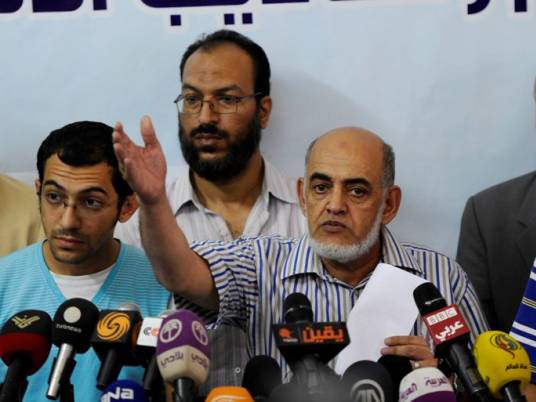
Supporters of deposed Islamist President Mohamed Morsy have called on Egyptians to hold mass protests on November 4, the day he goes on trial for inciting murder, raising the prospect of more bloodshed as the country's political crisis drags on.
The trial could further inflame tensions between Morsy's Muslim Brotherhood and the army-backed government and deepen the instability that has decimated tourism and investment in the most populous Arab state.
Army chief Abdel Fattah al-Sisi overthrew Morsy in July after mass protests against his rule and announced a political roadmap he said would lead to free and fair elections.
Backers of Morsy, Egypt's first freely elected president, say his removal was a coup, reversing the gains of the popular uprising which toppled autocrat Hosni Mubarak in 2011.
"The Alliance notes that the coup organizers would like to break the people's and the revolution's will by trying Dr. Mohamed Morsy, the President of the Republic, and his associates, this coming November 4th," a pro-Morsy grouping that includes the Brotherhood said in a statement.
"The Alliance also calls on all free people in Egypt and abroad to stand by the revolutionary will opposing the military coup, and that all activities should be – as they always have been – within peaceful bounds that define our methods and strategy."
A judge has said Morsy and other Brotherhood members have been charged with "inciting the killing and torture of protesters in front of the Etihadeya (presidential) palace".
The charges relate to the deaths of about a dozen people in clashes outside the presidential palace last December after Morsy enraged protesters with a decree expanding his powers.
SECURITY CRACKDOWN
Morsy has been held in a secret location since his overthrow on July 3. Since then, Egypt has been rocked by almost daily attacks by militants in the Sinai Peninsula and clashes between supporters and opponents of the Brotherhood.
Hundreds of Brotherhood members have been killed and top leaders have been jailed in one of the toughest security crackdowns in the movement's history.
Morsy's followers accuse the government of becoming increasingly authoritarian and taking the country back to the days of Mubarak, who ruled with an iron fist for three decades.
Security sources said Morsy was expected to be tried at a Cairo police institute near Tora, Egypt's most notorious prison, which held Mubarak until he was moved to house arrest in August.
Islamists have staged numerous demonstrations calling for the reinstatement of Morsy, prompting the government to consider imposing severe restrictions on protests, a move that has drawn fire from human rights groups.
Protests have spread to university campuses, including Al-Azhar, the ancient seat of Sunni Muslim learning, which has historically toed the government line.
"We have seen the heroic free youth in the universities – and in particular Al-Azhar University – give the best example of steadfastness, dignity and honor," said the alliance.
"Those youth shook the thrones of the tyrants and oppressors, and spread fear in their hearts. So a salute to those free youth."
The upheaval worries Cairo's Western allies, who were hoping the uprising that ended Mubarak's rule would turn the region's biggest country into a democratic success story.
The United States and European Union had wanted an inclusive political process in Egypt, which has a peace treaty with Israel and controls the Suez Canal waterway between Europe and Asia.
But there are no signs that either the Brotherhood or the army-backed government is ready to compromise.
Aside from the political crisis, Egypt's interim government faces an Islamist insurgency in the Sinai, near Israel and the Gaza Strip. Gaza is run by the Palestinian militant group Hamas, an offshoot of the Muslim Brotherhood.
Attacks on soldiers and policemen have risen sharply since Morsy was toppled. Gunmen killed a policeman in northern Sinai on Thursday, security sources said.
Fears are growing that an Islamist insurgency could take hold beyond the Sinai. A Sinai-based militant group inspired by al Qaeda claimed responsibility for a failed suicide bombing on Egypt's interior minister in September.




